by Aoife Donnellan // Apr. 16, 2024
This article is part of our feature topic Grief.
Lauryn Youden’s practice reexamines fundamental assumptions about the intersection between contemporary art and the body’s relationship to space, care and rest. Her work takes inspiration from her personal experiences navigating the medical-industrial complex and alternative healing practices, accompanied by an in-depth research methodology, which prioritises approaches to radical care as well as knowledge sharing. Using her personal mobility aids in installations, staging collective listenings of Mozart’s ‘The Great Mass in C Minor’ (an offering for the life of his wife who was ill), and ritualistic letter burning are just some of the ways in which Youden interrogates the boundaries between life and death.
Youden will perform her work, ‘you’re seeping into my bloodstream,’ as part of E-WERK Luckenwalde’s two-day festival ‘The Drop Out: Tell Them I Said No,’ running from May 3rd to 4th. The festival, inspired by Martin Herbert’s collection of essays ‘Tell Them I Said No’ (2016), will consider resistance and who has the privilege of refusal, as well as artistic vulnerability. Ahead of this performance, we spoke about longing, community and grief as a companion.
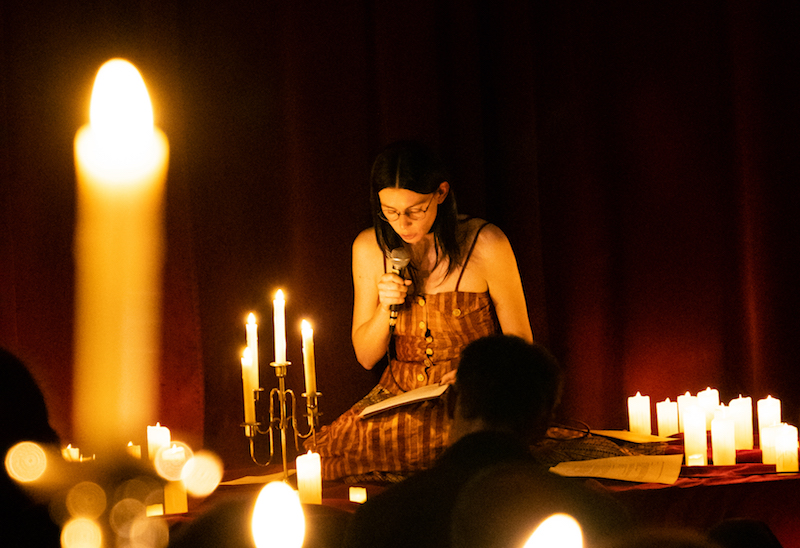
Lauryn Youden: ‘you’re seeping into my bloodstream,’ 2023, Pogo Bar – KW Institute for Contemporary Art // Courtesy of the artist and KW
Aoife Donnellan: Does the interdisciplinary nature of your practice, which includes a combination of poetry readings, performative lectures, installations, essays and sculpture among many other things, inform the content of the work? How does your choice of media reflect central elements of your practice?
Lauryn Youden: Completely, though rather than informing, I think of it as a methodology for processing and re-contextualizing all of my ongoing research. My research ends up materializing as specific mediums within my practice, but is also always in continual dialogue and interaction with each other.
My writing practice is the foundation of my entire practice—where one can find the concepts, theories and histories I am working with in my installations and sculptural works. So my choice of media naturally follows what I am researching and writing about, which is completely new to me, such as in last year’s sculptural installation ‘Venus in Scorpio,’ which included my personal mobility devices and Le Corbusier’s infamous LC4 and LC3 chairs to confront how disease and eugenics are at the core of modernist architecture and therefore the architecture of our daily lives, making both our homes and furniture inherently violent and ableist. Works such as ‘you’re seeping into my bloodstream’ are a continuation of my exploration and interest in how I conceive of chronic illness as a near-death experience and expand on this through a Crip queer lens. I’m working with the trope of the lesbian vampire, Rilke’s angels in his love letters the ‘Duino Elegies’ all in dialogue with the concept of limerence—a psychological disorder brought on by complex post-traumatic stress disorder, or what some would describe as being neurodivergent and in love.
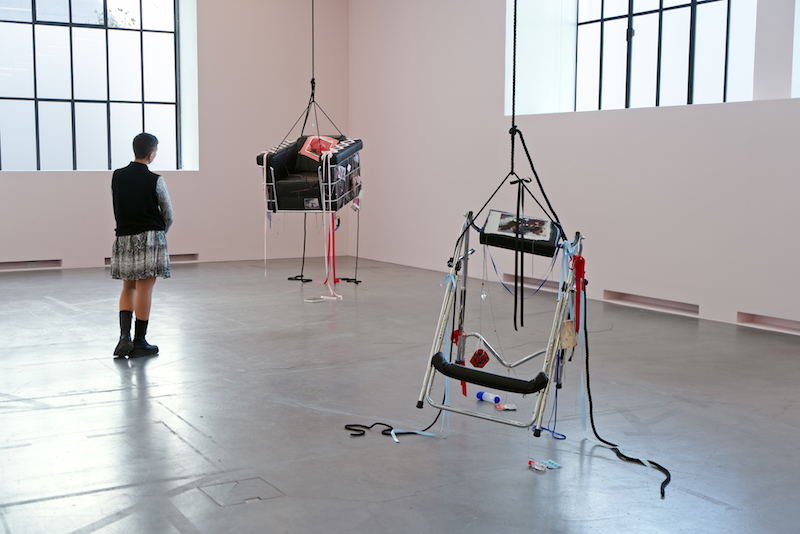
Lauryn Youden: ‘Interdependencies: Perspectives on Care and Resilience,’ 2023/24, installation view, Migros Museum Zurich // Courtesy of the artist
AD: As you’ve mentioned, the performance work, ‘you’re seeping into my bloodstream’ has been described as an “exploration of chronic illness as near-death experience” or a “time of ‘non-death.’” What part, if any, does grief play in this non-death?
LY: Grief, like longing, is at the center of my work, as is it in my lived experience with chronic illness and disability. Especially over the last 7 years, during which I have experienced extreme loss of ability, both physically and cognitively, to then slowly regain what I thought I had lost forever. You can only embrace the constant state of change and learn to have grief as a dear companion that guides you through these sick trajectories. This experience is central to what this concept of “non-death” means for me.
From Susan Sontag’s ‘Illness as Metaphor’: “Illness is the night-side of life, a more onerous citizenship. Everyone who is born holds dual citizenship, in the kingdom of the well and in the kingdom of the sick.” This quotation illustrates how illness creates a parallel existence while offering a poignant insight for those unaffected by serious illnesses to grasp the distinct realm shaped by the presence of disease.
In ‘you’re seeping into my bloodstream,’ I connect this dimension of grief with the vampire as both the violent metaphor that dehumanizes the severely diseased and chronically ill but also through the Crip queer lens that counters it, as a celebration of “forbidden” love and desire. Were they “best friends” or were they blood-sucking vampires? The answer is they were actually just two lesbians in love at a time when heteronormative patriarchal society could not comprehend nor allow it. So, in regards to grief, the vampire for me is the incarnation of this endless longing, where blood is care, eternal love is limerence. Like the chronically ill, their world is painted in grief. We all are citizens of the kingdom of the ill.
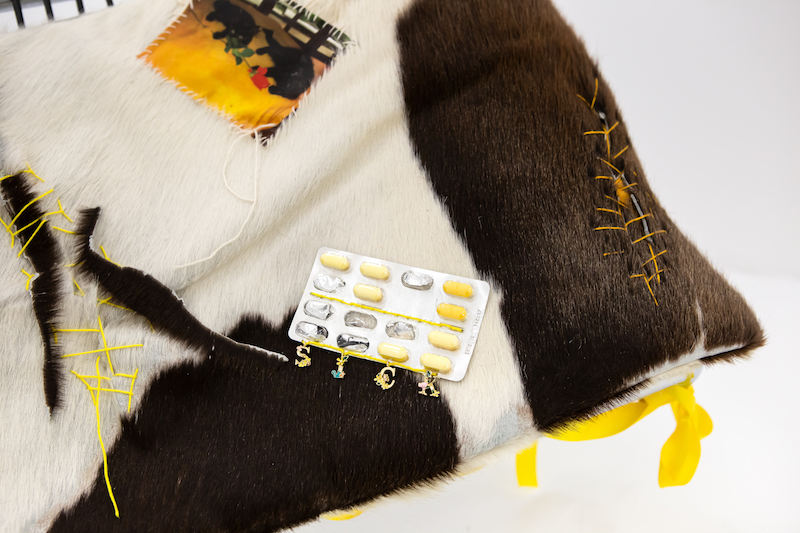
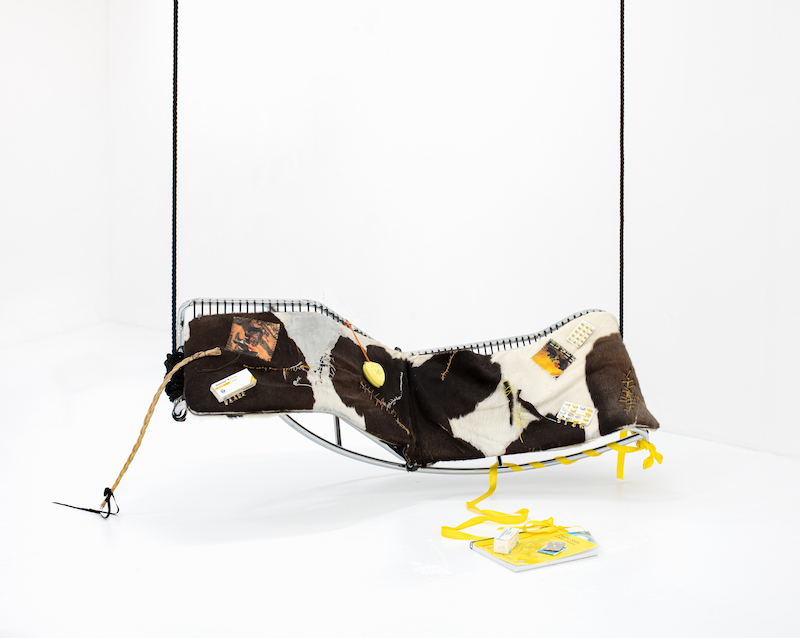
Lauryn Youden: ‘Bitch I’m a Cow,’ 2023, LC4 lounge chair, cowhide, various materials, 160 x 54 x 400cm // Courtesy of the artist
AD: Ritual and collectivity play a large part in many of your works, for example, the burning of letters in ‘Dead Paper’ or collective listening in ‘My Love: A Series of Sonic Rituals at a Time of Illness and Death.’ What role does the audience play in your performance work?
LY: Rather than thinking about what role the audience plays in my work, I instead come from a place of what I can offer to a public, whether that is an audience to one of my performances or a visitor in an exhibition of mine. This method is in every aspect of my practice: what resources, histories and tools I can offer. I recognize as an artist I have a public platform and with it I believe it is important to share the resources I have gained and learned to survive as a disabled and chronically ill person, because I wouldn’t be here today if others hadn’t done the same. And I mean this in every aspect of cultural production art, writing, activism, community work, etc.
For ‘My Love’ this was taking place right as lockdown measures were loosening up from winter 2020, when it was illegal in Germany to meet with more than 10 people in a group outside. The act of collective listening allows gentle intimacy to grow between people, which is what we all needed after such a dark isolated winter. This was especially touching as the piece, ‘The Great Mass in C Minor’ by Mozart, that we listened to, was made as an offer to “god” to save his wife who was deathly ill. Mozart composed the piece with a solo specifically written for her to sing. So it was especially powerful to listen to this piece as a collective—especially Constanze’s solo—given this context and the specific time we were listening to it all together, while knowing she survived and we did too.
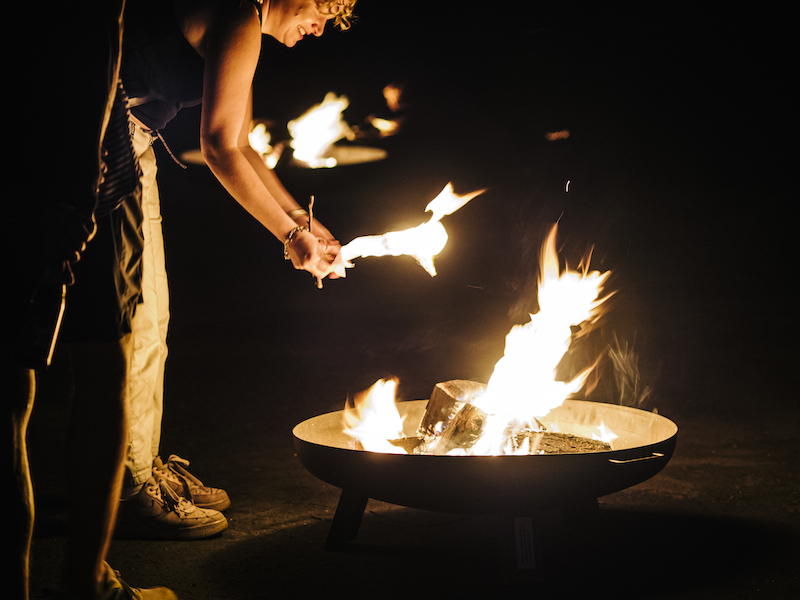
Lauryn Youden: ‘Witches, Rituals, and Healing,’ 2022 at Floating University, COVEN BERLIN, Zoë Claire Miller, Lauryn Youden // Photo by Daniel Seiffert
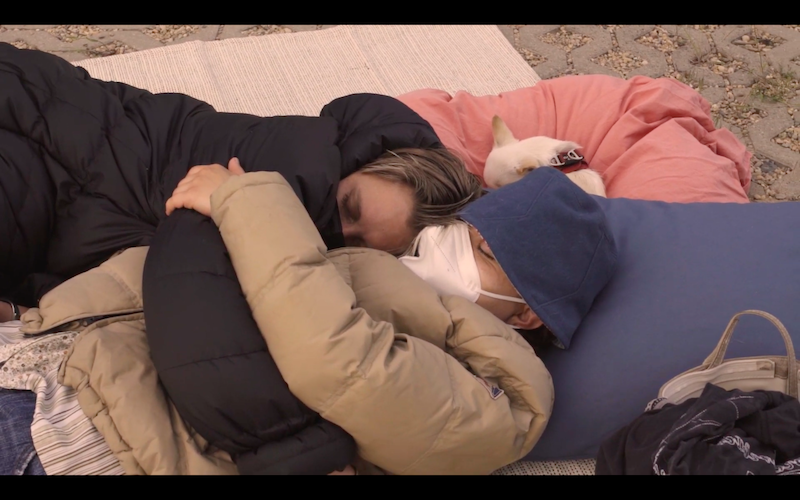
Lauryn Youden: ‘My Love,’ film still // Courtesy of the artist
AD: Your practice is often agentic, examining chronic illness in a collaborative setting, inviting audiences to listen, write and move through space. What role does collaboration play in your practice?
LY: I think this returns to me offering up rituals, tools, exercises and opportunities for active listening as a methodology of my practice and how to make all of this accessible, even if it is only one or two of these activities. I wouldn’t necessarily call this a collaboration with the audience because as you have said I am also offering them the agency to participate at any level that is available or desired by them at the time.
The core of collaboration in my practice is with the musicians I have worked with, such as Florian TM Zeisig and Scott Carver, to develop music together for my performances that resonate with the topics, emotionally and conceptually. As my performance practice has grown it has been an unexpected joy to work with these two in such ways. I worked with Scott Carver to develop the nightmarish soundscape of Alice Notley’s ‘The Descent of Alette’—a subterranean world of perpetually moving trains and grotesque stations—for my performance ‘The Descent’ in Kunsthalle Zurich’s Backroom basement exhibition space, which was transformed into one of the New York City’s secret City Hall subway station platforms. Collaborating once more with Scott for ‘you’re seeping into my bloodstream’ allowed us to cultivate yet another Crip underworld soundscape that highlights the liminality of the experience of non-death.
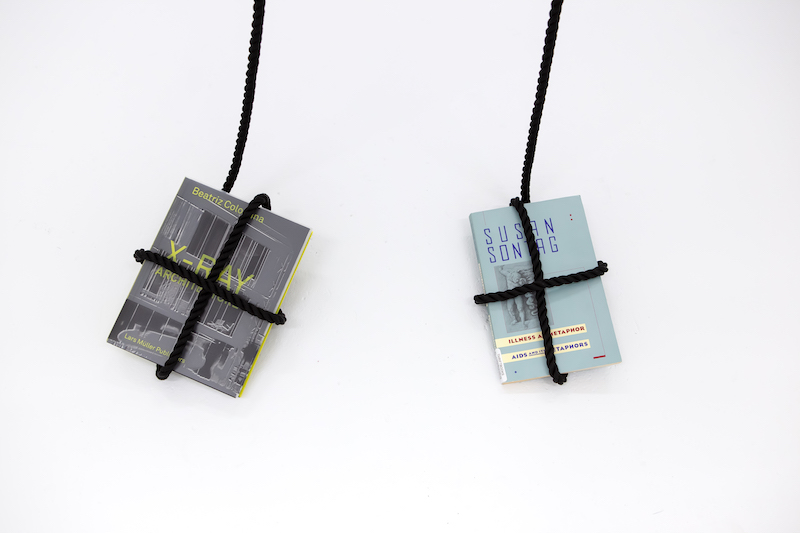
Lauryn Youden: ‘The Fear of Disease,’ 2023, MU Quad, cane, walking stick, various materials // Courtesy of the artist
AD: Have you reimagined elements of ‘you’re seeping into my bloodstream’ ahead of its reprise at E-WERK? Does the theme of the festival, “tell them I said no” re-contextualise the work for you?
LY: This will really be quite a special iteration of this work, as it will take place in the saunas within the Stadtbad Luckenwalde, an area that has never been activated by a performance before and, like the rest of the Stadtbad, has been left untouched for many years. It is the definition of liminal, which is where I find my performances are most at home and within this context one that carries a quantifiable measure of “self-care,” so to say, through the dust on the walls left behind by the many workers who frequented the place, as well as the haunted presence of the historical context of that “self-care,” brings a greater complexity to this work and an audience’s experience of it.
I think the theme of the festival speaks to the innate anti-capitalist Crip subjectivity of my work in general. In this piece, particularly, it speaks to both the refusal to comply via comedic romanticization of the darker aspects of love and illness, of obsession and desire and the destruction of the concept of a savior. It asks: can you not enjoy the fruits of romantic self-destruction and have your cake, too? And the Angels within the texts very firmly but cheekily answer: not without severe consequence.
Artist Info
Exhibition Info
E-Werk Luckenwalde
‘The Drop Out: Tell Them I Said No’
Festival: May 3–4, 2024
Admission: € 17 (2-Day Early Bird Ticket)
kunststrom.com
Tickets: eventbrite.de
Rudolf-Breitscheid-Straße 73, 14943 Luckenwalde, click here for map
























